The 50th Session of the Human Rights Council
13 June – 8 July 2022
Agenda Item 10: Technical Assistance and Capacity Building
5 July 2022
By Conall Corrigan / GICJ
Executive Summary
Despite a lack of access to the area, the Office of the High Commissioner for Human Rights (OHCHR) has confirmed that Russian authorities in Ukraine have been responsible for a range of human rights violations including the use of torture and cruel, inhuman or degrading treatment against civilians, restrictions on freedom of opinion, expression, and peaceful assembly, and limits on the rights of accused persons to a public trial.
During the 35th meeting of the 50th Regular Session of the HRC on the 5th of July, the High Commissioner for Human Rights, provided an oral presentation on the situation in and discussed the interim report of the Secretary-General on the human rights situation in Crimea. During her oral update, Ms Bachelet noted that civilians are bearing the brunt of hostilities that seemingly have no end in sight. Despite this, she reiterated the UN’s commitment to monitoring the human rights situation across Ukraine to provide redress for victims.
Most states were eager to denounce Russia’s actions in Ukraine with some asking the High Commission how they can prevent further violations of international humanitarian law (IHL) and international human rights law (IHRL) and ensure accountability for the benefit of victims.
Geneva International Centre for Justice (GICJ) continues to condemn Russia’s actions in Ukraine and urges all parties to the conflict to abide by its obligations under international law. GICJ commends the accountability initiatives already undertaken most notably by the ICC and the Commission of Inquiry on Ukraine.
Background
The General Assembly’s passage of Resolution 76/179 on the situation of human rights in the temporarily occupied Autonomous Republic of Crimea and the city of Sevastopol requested the Secretary-General to report on the progress made in the implementation of the resolution. The Secretary-General was also asked to submit an interim report to the Human Rights Council at its 50th session in order to assess the current situation in the region and provide suggestions for its improvement.
Additionally, pursuant to Resolution 47/22 on cooperation with and assistance to Ukraine in the field of human rights, the Human Rights Council asked the United Nations High Commissioner for Human Rights to continue to present an oral update to member states of the Human Rights Council on the situation of human rights in Ukraine as part of an Interactive Dialogue.
Oral Update by the High Commissioner for Human Rights
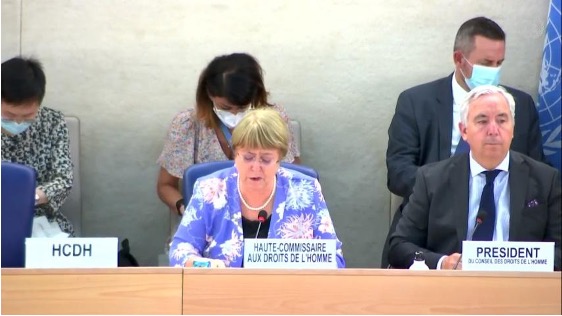 Ms Bachelet noted that her findings covered the period between the 24th of February to the 15th of May and were based on information gathered by the UN Monitoring Mission in Ukraine. The information was collated during 11 field visits which included 517 interviews with witnesses and survivors of human rights abuses and 3 visits to places of detention. She emphasised that the conflict has become synonymous with mass displacements and daily killings but reaffirmed the UN’s commitment to continue monitoring the human rights situation across Ukraine. The high number of casualties and damage to civilian infrastructure continues to rise amid concerns that attacks carried out by Russian armed forces and affiliated groups stand in violation of IHL. However, the High Commissioner also noted that Ukrainian armed forces operating in eastern parts of the country have failed to comply with their IHL obligations in certain instances. As of the 3rd of July, OHCHR has documented over 10,000 civilian deaths and injuries across Ukraine. Ms Bachelet acknowledged that 335 children were among the 4889 documented deaths resulting from the conflict so far. Most of the conflict-related deaths have stemmed from the use of explosive weapons in populated areas including shelling from heavy artillery and airstrikes. The High Commissioner lambasted the conduct of Russian armed forces during the conflict claiming that they have “continued to operate in the same way with predictable results”. However, she acknowledged that both parties to the conflict had employed the use of human shields and criticised the use of this practice.
Ms Bachelet noted that her findings covered the period between the 24th of February to the 15th of May and were based on information gathered by the UN Monitoring Mission in Ukraine. The information was collated during 11 field visits which included 517 interviews with witnesses and survivors of human rights abuses and 3 visits to places of detention. She emphasised that the conflict has become synonymous with mass displacements and daily killings but reaffirmed the UN’s commitment to continue monitoring the human rights situation across Ukraine. The high number of casualties and damage to civilian infrastructure continues to rise amid concerns that attacks carried out by Russian armed forces and affiliated groups stand in violation of IHL. However, the High Commissioner also noted that Ukrainian armed forces operating in eastern parts of the country have failed to comply with their IHL obligations in certain instances. As of the 3rd of July, OHCHR has documented over 10,000 civilian deaths and injuries across Ukraine. Ms Bachelet acknowledged that 335 children were among the 4889 documented deaths resulting from the conflict so far. Most of the conflict-related deaths have stemmed from the use of explosive weapons in populated areas including shelling from heavy artillery and airstrikes. The High Commissioner lambasted the conduct of Russian armed forces during the conflict claiming that they have “continued to operate in the same way with predictable results”. However, she acknowledged that both parties to the conflict had employed the use of human shields and criticised the use of this practice.
The High Commissioner’s office underlined that the conflict has resulted in the displacement of 8 million people which has had a disproportionate impact on women, children, older persons, and persons with disabilities. Moreover, restrictions on freedom of movement to and from regions occupied by Russian armed forces or affiliated groups are reducing access to basic services. Ms Bachelet confirmed that over 400 medical and educational facilities have been destroyed although acknowledged that this number is likely much higher. So far, thousands of homes have been destroyed and the Ukrainian government is currently working to establish a comprehensive compensation mechanism to provide relief to those who have lost their property. The High Commissioner noted that the current draft of this law excludes residents of territories controlled by Russian armed forces but reminded the Council that all victims have equal rights to remedies. Ms Bachelet expressed concern about the use of unlawful killings including summary executions. She claimed there was growing evidence suggesting that serious violations of IHL in this regard have been committed by Russia. As of the 15th of May, over 1200 civilian bodies have been recovered in Kyiv alone and her office is working to corroborate over 300 allegations of killings by Russian armed forces that were not linked to active fighting. The High Commissioner stressed that the arbitrary detention of civilians has become a widespread practice in territory controlled by Russia. Despite restrictions on access, the OHCHR has documented 270 cases of arbitrary detention and enforced disappearance. Additionally, Ukrainian security forces and national police have reportedly arrested over 1000 individuals accused of supporting Russian armed groups. Ms Bachelet claimed she was worried that these arrests may not have been carried out in line with Ukraine’s international human rights obligations and conceded that 12 particular cases may amount to enforced disappearance by Ukraine. The High Commissioner accused both sides of committing appalling acts of torture and ill treatment against POWs and lamented the lack of progress in holding those responsible to account. Her team has confirmed 28 cases of conflict-related sexual violence including cases of rape, threats of sexual violence, and forced public stripping. She welcomed Ukraine’s recent ratification of the Council of Europe’s Convention on preventing and combatting violence against women.
Ms Bachelet highlighted the 17 confirmed deaths of journalists, bloggers, and media workers resulting from hostilities. She stressed that, in Crimea, new legislation is curtailing the already limited space to express dissenting opinions. Presently, 41 cases of prosecution of Crimean residents for discrediting Russian armed forces have been documented and multiple media outlets have been blocked including access to websites addressing human rights and IHL violations. The High Commissioner called for independent, impartial, and effective investigations into all cases of torture, ill treatment, and enforced disappearances adding that the impacts of this conflict stretch far beyond Ukraine’s borders and continues to widen day by day. She urged all parties to the conflict to ensure full compliance with their obligations under IHL and IHRL. She concluded her update by encouraging the international community to support actors working with survivors of sexual violence and mistreatment, particularly in smaller towns and rural areas. She appealed to all parties involved in the conflict to provide her office and independent monitors unimpeded access to places of detention and stressed the need for both factions to carry out investigations into all allegations of IHL and IHRL.
Speakers of the Countries Concerned
The President of the HRC noted that the Russian Federation was in the chamber but chose to take the floor in the context of the list of speakers before allowing the representative of Ukraine to speak.
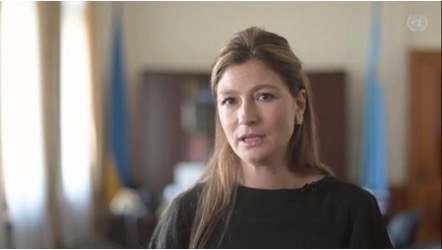 The Ukrainian representative began by noting that the entire nation has now been subjected to a great deal of pain and suffering that will affect future generations. She stressed that the epicentre of hostilities has now turned to Ukraine’s Eastern and Southern region and that the list of towns and cities facing the same devastating fate of Mariupol is becoming longer. Many cities have become uninhabitable with numerous areas under constant threat of missile attacks. In the previous week at least 500 cases of shelling were used against civilian infrastructure across Ukraine. As a result of the conflict, at least 2.5 million people have had their homes destroyed. The delegate emphasised that, from a military perspective, the recent bombing of a shopping centre in the city of Kremenchuk which killed dozens of civilians, makes no sense and labelled it a “clear cut terrorist attack”. Although she acknowledged that the Prosecutor General’s Office of Ukraine had registered more than 20,000 crimes of aggression and war crimes committed by Russian forces, she appealed to international human rights and investigative mechanisms to provide their objective assessment of all Russian crimes.
The Ukrainian representative began by noting that the entire nation has now been subjected to a great deal of pain and suffering that will affect future generations. She stressed that the epicentre of hostilities has now turned to Ukraine’s Eastern and Southern region and that the list of towns and cities facing the same devastating fate of Mariupol is becoming longer. Many cities have become uninhabitable with numerous areas under constant threat of missile attacks. In the previous week at least 500 cases of shelling were used against civilian infrastructure across Ukraine. As a result of the conflict, at least 2.5 million people have had their homes destroyed. The delegate emphasised that, from a military perspective, the recent bombing of a shopping centre in the city of Kremenchuk which killed dozens of civilians, makes no sense and labelled it a “clear cut terrorist attack”. Although she acknowledged that the Prosecutor General’s Office of Ukraine had registered more than 20,000 crimes of aggression and war crimes committed by Russian forces, she appealed to international human rights and investigative mechanisms to provide their objective assessment of all Russian crimes.
The representative highlighted the global consequences current hostilities are having in some of the poorest regions of the world. She stressed that “when Putin could not break the will of the Ukrainian people, he decided to take the international community hostage”. She further noted that if the Russian blockade of Ukraine’s harbours persists millions of tonnes worth of food will rot, resulting in tens of millions of people starving in Africa and Asia. Ukraine underlined that Crimea has been turned into an area riddled with gross violations of human rights including politically motivated arrests and forced conscription. The delegate concluded by claiming that Russia has displayed a complete lack of regard for IHL and human rights throughout the conflict and emphasised that justice can only be restored through providing accountability and ensuring the full restoration of the territorial integrity of Ukraine. She urged the international community to make a concerted effort to work towards these goals to ensure the Ukrainian people are able to access effective remedies.
Human Rights Council Discussion
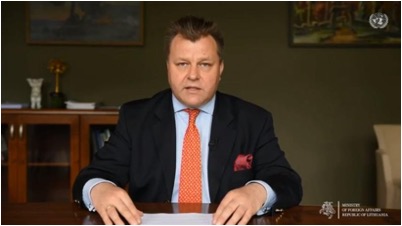 Lithuania on behalf of Nordic and Baltic countries claimed to be horrified by Russia’s unprovoked aggression towards Ukraine and reminded the Council that the killing of thousands of civilians, including children, and the bombing of civilian infrastructure is unacceptable and may amount to war crimes. The representative urged the international community to hold Russia accountable for its actions. Concerns were raised about the deteriorating human rights situation in Crimea with reports of arbitrary detention, instances of torture, and forced relocation becoming commonplace. The delegate urged Russia to grant international monitoring and human rights mechanisms unimpeded access to Crimea and conflict areas in Ukraine to ensure an impartial investigation of all allegations of human rights violations and abuses can be carried out. Lithuania called on Russia to withdraw all of its troops from Ukraine and reiterated its support of the sovereignty, territorial integrity and independence of Ukraine. The representative concluded his statement by asking the High Commissioner how states can provide support for human rights defenders in Ukraine.
Lithuania on behalf of Nordic and Baltic countries claimed to be horrified by Russia’s unprovoked aggression towards Ukraine and reminded the Council that the killing of thousands of civilians, including children, and the bombing of civilian infrastructure is unacceptable and may amount to war crimes. The representative urged the international community to hold Russia accountable for its actions. Concerns were raised about the deteriorating human rights situation in Crimea with reports of arbitrary detention, instances of torture, and forced relocation becoming commonplace. The delegate urged Russia to grant international monitoring and human rights mechanisms unimpeded access to Crimea and conflict areas in Ukraine to ensure an impartial investigation of all allegations of human rights violations and abuses can be carried out. Lithuania called on Russia to withdraw all of its troops from Ukraine and reiterated its support of the sovereignty, territorial integrity and independence of Ukraine. The representative concluded his statement by asking the High Commissioner how states can provide support for human rights defenders in Ukraine.
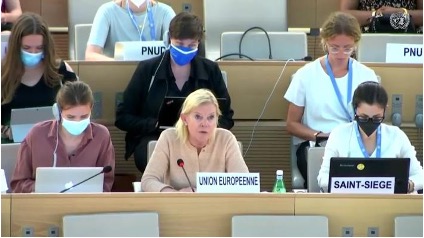 The European Union condemned all violations of IHL in Ukraine and expressed shock at the use of torture, arbitrary and extrajudicial executions, enforced disappearances, and conflict-related sexual and gender-based violence within the country. The representative reiterated calls for Russia to comply with its obligations under international law and claimed that those responsible for any violations of IHRL must be held accountable for their actions. The delegate asked the High Commissioner how the international community can work better collectively towards the prevention of further violations of IHL and IHRL in Ukraine.
The European Union condemned all violations of IHL in Ukraine and expressed shock at the use of torture, arbitrary and extrajudicial executions, enforced disappearances, and conflict-related sexual and gender-based violence within the country. The representative reiterated calls for Russia to comply with its obligations under international law and claimed that those responsible for any violations of IHRL must be held accountable for their actions. The delegate asked the High Commissioner how the international community can work better collectively towards the prevention of further violations of IHL and IHRL in Ukraine.
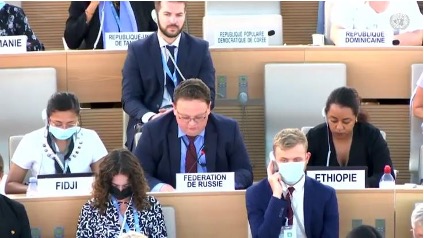 The Russian delegation asserted that the OHCHR has debased itself to become an instrument serving the interests of one group of states. He noted that the tone and content of the report on Crimea demonstrates that the OHCHR is part of a disinformation campaign against Russia which is responsible for spreading lies and manipulating public opinion in an effort to justify supplying weapons to the Ukrainian government. The representative criticised the report for not discussing the fact that Ukrainian armed forces have been responsible for destroying places of religious worship. Moreover, Russia reprimanded the High Commissioner and the Head of the Observer Mission to Ukraine for failing to discuss the mass shelling of apartment blocks and civilian infrastructure in the Donetsk People's Republic (DPR) and the Luhansk People’s Republic (LPR) by Ukrainian armed forces in May and June with weapons he claimed were in part supplied by NATO countries. The delegate claimed that with the HRC’s tacit approval, Ukrainian “neo-Nazis” have terrorised the civilian population of Donbas and have now become accomplices to crimes carried out by the Ukrainian government and their western sponsors. He claimed that the actions of member states not only undermine confidence in the HRC but also all of the activities of the UN.
The Russian delegation asserted that the OHCHR has debased itself to become an instrument serving the interests of one group of states. He noted that the tone and content of the report on Crimea demonstrates that the OHCHR is part of a disinformation campaign against Russia which is responsible for spreading lies and manipulating public opinion in an effort to justify supplying weapons to the Ukrainian government. The representative criticised the report for not discussing the fact that Ukrainian armed forces have been responsible for destroying places of religious worship. Moreover, Russia reprimanded the High Commissioner and the Head of the Observer Mission to Ukraine for failing to discuss the mass shelling of apartment blocks and civilian infrastructure in the Donetsk People's Republic (DPR) and the Luhansk People’s Republic (LPR) by Ukrainian armed forces in May and June with weapons he claimed were in part supplied by NATO countries. The delegate claimed that with the HRC’s tacit approval, Ukrainian “neo-Nazis” have terrorised the civilian population of Donbas and have now become accomplices to crimes carried out by the Ukrainian government and their western sponsors. He claimed that the actions of member states not only undermine confidence in the HRC but also all of the activities of the UN.
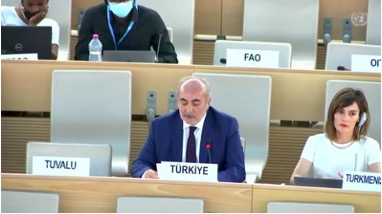 The representative of Turkey noted that they have consistently stood for the need to maintain Ukraine’s territorial integrity since 2014 and do not recognise the illegitimate annexation of Crimea. He stressed that the proliferation of ongoing political trials, unlawful detention, and interrogations since the takeover of Crimea is increasingly worrying with more issues continuing to emerge as a result of the ongoing war in Ukraine. The delegate warned that the protracted war could lead to further loss of life and more violations of IHRL and have a negative impact on global food security. Turkey acknowledged that in order to contribute to international efforts to resolve the global food crisis, they have held several diplomatic talks with Russian, Ukrainian, and UN officials at various levels. He added that if all necessary parties display a willingness to resolve these matters diplomatically, Turkey is ready to host a meeting in Istanbul.
The representative of Turkey noted that they have consistently stood for the need to maintain Ukraine’s territorial integrity since 2014 and do not recognise the illegitimate annexation of Crimea. He stressed that the proliferation of ongoing political trials, unlawful detention, and interrogations since the takeover of Crimea is increasingly worrying with more issues continuing to emerge as a result of the ongoing war in Ukraine. The delegate warned that the protracted war could lead to further loss of life and more violations of IHRL and have a negative impact on global food security. Turkey acknowledged that in order to contribute to international efforts to resolve the global food crisis, they have held several diplomatic talks with Russian, Ukrainian, and UN officials at various levels. He added that if all necessary parties display a willingness to resolve these matters diplomatically, Turkey is ready to host a meeting in Istanbul.
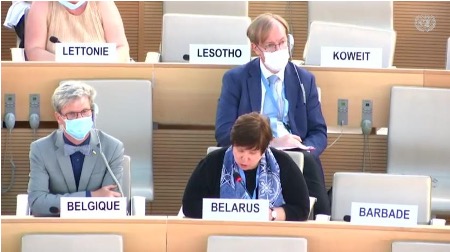 The Belarusian delegate claimed that the conflict in Ukraine had emerged as a result of years of NATO countries ignoring the legitimate interests of other states and blocking dialogue on pressing regional security issues. She added that Kyiv’s policy of rejecting the Minsk agreements and discriminating against the Russian speaking population of Donbas had acted as a further catalyst in triggering hostilities in the region. Belarus noted that the conflict has exposed the problems of modern warfare to which the international community, including the HRC, needs to respond. These include the use of civilian sites for military purposes and civilians as human shields in violation of the Geneva Conventions. She concluded her remarks by criticising the HRC for focusing solely on accusations against Russian claiming that this represents a double standard which undermines the representative nature of the body.
The Belarusian delegate claimed that the conflict in Ukraine had emerged as a result of years of NATO countries ignoring the legitimate interests of other states and blocking dialogue on pressing regional security issues. She added that Kyiv’s policy of rejecting the Minsk agreements and discriminating against the Russian speaking population of Donbas had acted as a further catalyst in triggering hostilities in the region. Belarus noted that the conflict has exposed the problems of modern warfare to which the international community, including the HRC, needs to respond. These include the use of civilian sites for military purposes and civilians as human shields in violation of the Geneva Conventions. She concluded her remarks by criticising the HRC for focusing solely on accusations against Russian claiming that this represents a double standard which undermines the representative nature of the body.
NGOs and National Human Rights Institutions
Various NGOs and national human rights institutions emphasised that they stand in solidarity with Ukraine and echoed the concerns expressed by the High Commissioner. They appealed to the Council and the wider international community to apply pressure on the Russian Federation to halt hostiles and end the practices of enforced disappearances, deportation, and the torture of abducted civilians. NGOs stressed that the shelling of schools, hospitals, and other civilian infrastructure highlights Russia’s complete lack of regard for the right to life. Many groups underscored the need to offer greater protections to women and children who have been disproportionately affected by the conflict. Additionally, speakers expressed concern over the lack of information provided on the conditions of prisoner’s detention or their access to food, water, and medical treatment. Evidence from inside detention facilities indicates that both the treatment of prisoners and the conditions of their detention may rise to the level of torture or ill-treatment. A large number of groups implored Russia to free all detained, sentenced and deported Ukrainians to allow them to return to their families.
Concluding Remarks of the High Commissioner
The High Commissioner noted that a significant number of accountability initiatives have already been put in place at the national, regional, and international levels to ensure individuals are held responsible for any crimes they may have committed. She added that the International Criminal Court’s (ICC) investigation is central to this process and stressed the need for member states to fully support the Ukrainian government’s ability to fairly, effectively and independently investigate all alleged crimes committed on its territory. Ms Bachelet reiterated that her office continues to document cases of violations of IHL and IHRL and expects the Independent International Commission of Inquiry on Ukraine (COI) to broaden the analysis and assessment of all relevant information.
The High Commissioner urged the international community to continue to call for an immediate cessation of all hostilities in Ukraine and implored both parties to ensure that their actions abide by IHL. She reminded the Council that member states can also support national human rights institutions, local civil society networks and other relevant actors by providing resources and strengthening their capacity to work with survivors of sexual violence, torture and ill-treatment, particularly in small towns and rural areas. Ms Bachelet concluded her remarks by repeating calls for all parties to the conflict to put human life and rights at the centre of cessation efforts in order to restore peace and support accountability and redress for all of those affected by hostilities.
Position of Geneva International Centre for Justice
Geneva International Centre for Justice (GICJ) continues to condemn Russia’s actions in Ukraine and urges all parties to the conflict to abide by its obligations under IHL and IHRL. GICJ commends the accountability initiatives already undertaken, most notably by the ICC and the Commission of Inquiry on Ukraine. We appeal for both to be sufficiently funded and resourced to ensure they can fully utilise their investigative powers and provide effective accountability for crimes committed during the conflict. Independent monitoring mechanisms must be granted effective access to all areas of Ukraine in order to adequately assess the damage caused by any and all human rights violations committed across the country. By doing this the international community can provide justice for those who have been forced to endure abuses of their fundamental rights and ensure legal avenues for redress.
Russia, Ukraine, Freedom, Human Rights, Interactive Dialogue, HRC50, Geneva4Justice, Justice, GICJ, Justice, GenevaInternationalCentreforJustice




